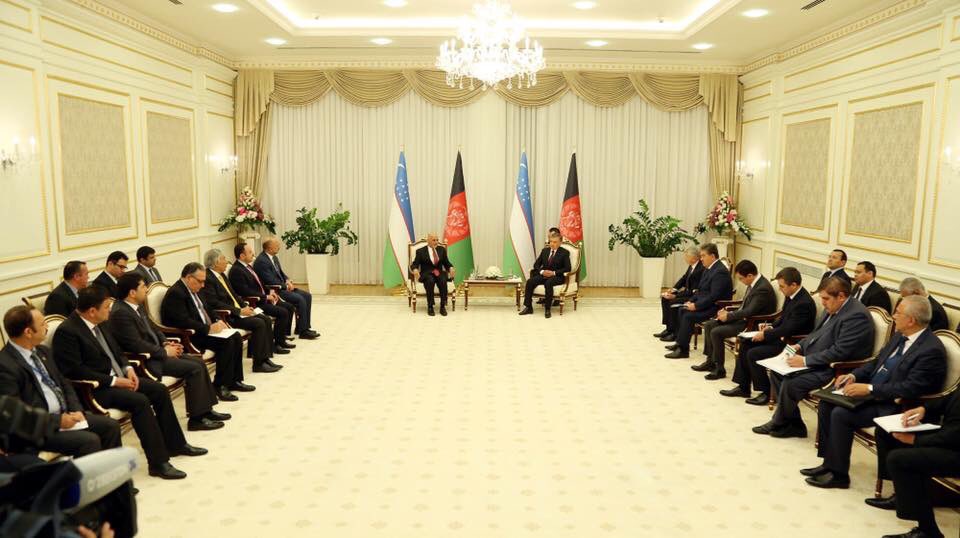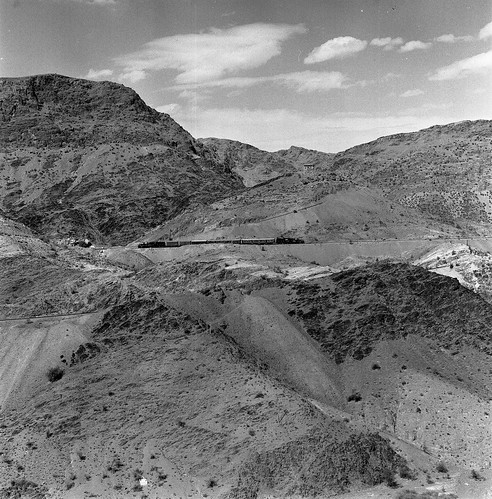“A pair of PWR Class HGC 2-8-0 locomotives (Nrs. 2200 and 2238) handle a typical mixed load through the majestic scenery in 1970”
Afghanistan to China rail freight discussions
President Ashraf Ghani’s advisor on Central Asian Affairs said after a meeting with Uzbekistan officials that Afghan traders will soon be able to export goods to China via rail once existing problems have been ironed out.
[…]
“(In 2016) the railway line was opened at the Afghanistan border (with Uzbekistan) from China as a pilot project. This will no longer be a pilot project. It will be a transit route. The railway trucks that used to return empty to China, will soon carry goods (from Afghanistan). But we need to solve problems inside our country and the commerce and industries ministry should solve the problems,” said Kargar.
[…]
“This is a big achievement. It takes us one and half months to transport goods from China, but (once the railway line opens) goods will arrive at our border in only 10 days,” said the head of Afghanistan’s Railway Authority, Abdul Bari Sediqi
[…]
Source: Officials Tackle Afghanistan-China Railway Line Issues, By Zabihullah Jahanmal, Tolo News, 24 June 2018
Torghundi railway photos
Some photos Tweeted in December 2017.
13 km #railways work completed at #torghondi dry #port btwn #Afghanistan & #Turkmenistan #transport#transit #trade pic.twitter.com/um61N5XbOb
— Sawabdin Makhkash (@smakhkash) December 9, 2017
Steam locos at Kabul museum in 1995
A 2 April 1995 photo of two locos outside the Darulaman museum by Swen Connrad/YumeVision.
The Looting of a Culture: Afghanistan’s Endangered Heritage
A young Mudjahedin next to a train engine and a coach in the backyard of the National Museum in 1995..Under the Rabani and Massoud government in 1992-1996, the National Museum was completely loot and destroy. .Kabul, Afghanistan.
Tajikistan plans route of TAT railway
AzerNews reports that Tajikistan’s Ministry of Transport has provided the government with a draft route for the Tajik section of the Tajikistan-Afghanistan-Turkmenistan railway.1 “The route of the Tajik section runs through the districts of J. Balkhi, Jaihun and Nizhny Pyanj”, the source said. “After the state commission approves the project, the feasibility study for the project will begin, that is, the length of the road, the number of bridges, etc. will be determined”.
Also known as Panji Poyon, Nizhny Pyanj is the location of a bridge over the river which forms the border between Tajikistan and Afghanistan .
References
- Tajikistan studying draft route of Tajikistan-Afghanistan-Turkmenistan railway, Kamila Aliyeva, AzerNews, 12 April 2018 ↩
Lapis Lazuli Route on Twitter
A new “official twitter account communicates about the multimodal #LapisLazuliRoute”
The route to the Central Asian & Caucasus, the path to regional prosperity #LapisLazuliRoute @RECCAfghanistan @mfa_afghanistan pic.twitter.com/GuLcuozbG3
— Lapis Lazuli Route (@RouteLapisL) April 4, 2018
Uzbekistan to part-fund Mazar-i-Sharif – Herat railway

Following the international Tashkent Conference on Afghanistan which was held on 26-27 March 2018, Afghanistan’s Ministry of Finance said Uzbekistan had pledged to provide USD500m to part-fund the construction of a proposed 657 km extension of the Uzbekistan to Mazar-e-Sharif railway onwards to Herat.1 This would connect with the line under construction from Iran to Herat, providing a transit route from Central Asia, and potentially China, to Iran and Europe.
Komil Allamjonov, Press-Secretary to the President of Uzbekistan, Tweeted:
#UzAfg2018 We are jointly promoting the implementation of another strategic project
– extension of the currently operating #Hairaton–#Mazar-i-Sharif railway built by #Uzbek specialists up to #Herat. #Uzbekistan #Afghanistan— Komil Allamjonov (@k_allamjonov) March 27, 2018
The Afghanistan Railway Authority estimates that the new line would cost USD1.8bn, and so the Afghan government is seeking additional funding from other countries.
AfRA head Mohammad Yama Shams told Tolo News that talks had begun with Iran and were ongoing with the Asian Infrastructure Investment Bank, while China was also interested in investing in the project. A contractor could be selected in the near future, according to AfRA, and construction would take two years. AfRA estimates that Afghanistan would earn about USD40m a year from the line.
The quoted cost works out at USD1.8bn/657 km = 2.73m USD/km. The Hairatan – Mazar-i-Sharif line cost USD170m for 75 km2 or 2.27 USD/km, so the numbers are not dissimilar.
in his address to the international conference,3 Uzbekistan’s President Shavkat Mirziyoyev said:
I have no doubt that in the long run peace on the Afghan soil will open up the new opportunities and bring real benefits to all states of the greater Eurasian continent. It will promote strengthening common security and stability, create favorable conditions for the construction of motorways and railroads, laying of pipelines, development of regional and trans-regional trade.
[…]
We are jointly promoting the implementation of another strategic project – extension of the currently operating Hairaton – Mazar-i-Sharif railway built by Uzbek specialists up to Herat.This project will allow to make a real and practical contribution to reconstruction of Afghanistan’s economy, create new jobs and increase the transit potential of the country.
Launching the trans-Afghan transport-communication projects in close integration with other and not less significant regional projects such as Uzbekistan–Turkmenistan–Iran–Oman and Uzbekistan-Kyrgyzstan–China will also create all necessary conditions for the development of intercontinental transport corridors in almost all directions – from north to south and from east to west through the shortest route.
Fazel Fazly, senior aide to the President of Afghanistan, tweeted:
Let’s start this morning with a good news- #Uzbekistan pledges to contribute 500 million USD for the construction of Mazar-i Sharif – Herat railway. #UzAfg2018
— Fazel Fazly (@FFazly) March 27, 2018
Eklil Hakimi, Afghanistan’s Minister of Finance said:
Uzbekistan will provide $500M to finance a portion of Mazar-Herat Railway. #UzAfg2018 pic.twitter.com/eK6JWrFLUX
— Eklil Hakimi (@EklilHakimi) March 27, 2018
Development Economist Rafi Fazil commented:
This is a good start for #Afghanistan bilateral ties with #Uzbekistan in the post Karimov era. Economic interdependence is an effective deterrence and guarantor of peace and stability in Central and South Asia. #UzAfg2018 https://t.co/74JBLZVo8y
— Rafi Fazil (@FazilRafi) March 27, 2018
Hameed Hakimi, Research Associate at Chatham House, pointed out:
This is encouraging news for Afghanistan of course but a lot of questions on details remain unanswered; a joint doc/strategy should explain how this railway will be built & timelines – security issues top concern too @EklilHakimi https://t.co/N2139n04ri
— Hameed Hakimi (@hameedhakimi) March 27, 2018
References
- Uzbekistan Ready To Help Fund Railway Project, Haidarshah Omid, Tolo News, 29 March 2018 ↩
- , Asian Development Bank, February 2014 ↩
- Address by the President of the Republic of Uzbekistan Shavkat Mirziyoyev at the international conference on Afghanistan «Peace process, security cooperation and regional connectivity», Official website of the President of Uzbekistan, 27 March 2018 ↩
MITRATV video of Hairatan
A 26-minute video showing the Friendship Bridge, trains, boats and other facilities at Hairatan, published by MITRATV on 25 November 2015. It’s not in English, so I don’t know what it says.
Hairatan in 1985
Turkmenistan Railways train in Afghanistan
Today 1st Train come to #Afghanistan via Torghondi railroad's from #Turkmenistan with high rink officials for the official inauguration of #TAPI project in #Herat province of #AFG. pic.twitter.com/M8gSX8Ub1U
— Rezwanullah Shpoon🇦🇫 (@shpoon1919) February 23, 2018

